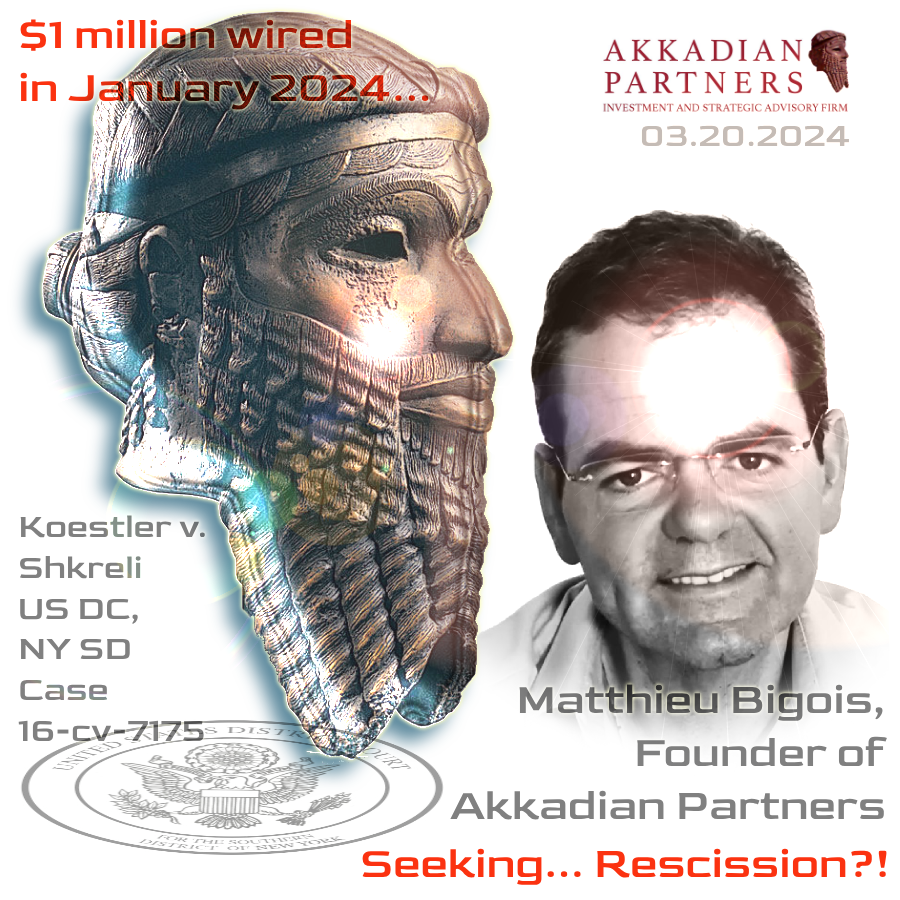 We've mentioned this Shkreli-related fight from time to time. . . and so, here is the likely end of it, on a sunny Friday afternoon -- with Caitlin Clark in action tonight (and Mr. Shkreli's clock running out, on any US Supreme Court appeal of his lifetime banning from the life sciences industries):
We've mentioned this Shkreli-related fight from time to time. . . and so, here is the likely end of it, on a sunny Friday afternoon -- with Caitlin Clark in action tonight (and Mr. Shkreli's clock running out, on any US Supreme Court appeal of his lifetime banning from the life sciences industries):
Exactly as I previously said, this claim to stop the release of funds the stock buyer already signed off on, over three months ago now. . . is a loser.
The objection from Akkadian and its counsel first claims Akkadian and counsel are owed legal fees, connected to the Delaware bankruptcy. But the precise verbiage of the stock sale contract doesn't allow for an offset of those ancillary, non-Manhattan fees. See the 5(c) of this contract -- each party to bear its own expenses.
And do note that the all caps, bold face warning it sets out in Section 5(a) -- that the shares are being sold "AS IS, WHERE IS". No promises, at all.
The meat of the claim, such as it is, is that the former shares of Martin have no value, and so the sale's essential purpose has been frustrated.
Of course, the problem with that argument is that Akkadian was NOT buying a black box; it structured the transaction, conducted due diligence, and even appeared in Delaware bankruptcy court, where full-blown monthly (not just quarterly) financial reports (like this one) were being made public -- for over 11 months prior to the wiring of the proceeds. And throughout the process of arranging and structuring the stock sale. Damn.
In sum, the Akkadian Stock Partners bought these ~35% controlling securities, with the fully-available due diligence materials in their hands, making it clear that this was a rapidly melting ice cream cone. More than that, they negotiated to restructure the board -- and wanted to pursue an R&D longshot program, which the other shareholders and board voted down.
 That's the nature of not having. . . a 51% stake. Sometimes things don't go your way.
That's the nature of not having. . . a 51% stake. Sometimes things don't go your way.
But there is no "do-over", under US law, for a stock sale, on these precise facts. Nothing in the letter claims that Mr. Abbott, as the Receiver -- or the board of Phoenixus AG (or Vyera) misled them.
The contract was to deliver shares -- with not even a whiff of a promise (in fact, "AS IS, WHERE IS"), as to the "final value" of those shares, given that Akkadian well knew it all was in bankruptcy in Delaware. In fact, just the opposite.
So, yes. . . this is silly. The able USDC Judge Cote will dump the claim, and allow the Receiver to disburse the funds, pretty shortly, Condor predicts.
But just to be fair, and for a complete record, here's the claim's most salient verbiage:
“. . .The common law of contract excuses a party from performing his contractual obligations because of ‘impossibility of performance’ or ‘frustration of purpose’”. United States v. Gen. Douglas MacArthur Senior Vill., Inc., 508 F.2d 377, 381 (2d Cir. 1974). “In general impossibility may be equated with an inability to perform as promised due to intervening events, such as an act of state or destruction of the subject matter of the contract.” Id. (“emphasis added). The Second Circuit further explained the doctrine of frustration of purpose as follows:
“Frustration of purpose. . . focuses on events which materially affect the consideration received by one party for his performance. Both parties can perform but, as a result of unforeseeable events, performance by party X would no longer give party Y what induced him to make the bargain in the first place. Thus frustrated, Y may rescind the contract. Discharge under this doctrine has been limited to instances where a virtually cataclysmic, wholly unforeseeable event renders the contract valueless to one party. . . .”
As set forth more fully below, a short while ago, the Debtors had over $8 million of cash on hand to fund the development of an experimental drug that the Debtors represented had the ability to make all creditors whole and result in a distribution to shareholders. That is, less than half-a-year ago, the Debtors had plenty of cash to actually fund a reorganized and operating debtor. The Debtors have squandered all of the available cash, without the Receiver having filed an objection in the Bankruptcy Court. . . .
Now, as to that last bit, all the Receiver was supposed to do (under applicable US law, and Judge Cote's prior orders) was try to get the most for Martin's shares, and to do so as quickly as possible (of course without telling any lies!), since other judgment creditors had been waiting to be paid for nearly a decade -- due to Martin stiffing them.
For a decade, more or less. Yep. Damn.
Akkadian loses. And Thomas Koestler only will see a small portion of what he is owed -- now over $6 million, with post-judgment interest.
So it goes. Onward, grinning.
नमस्ते
















No comments:
Post a Comment